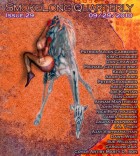You set your stories in Thorpe Village. Why is this place of special importance?
When I was young, I lived in a place very similar to the village I’ve called “Thorpe Village” in my piece. Apart from the pub, the whole place was unbearably lonely and quiet — most of the folks who lived there were elderly and we rarely saw any of the neighbors. As far as I know, I was the only teenager living in the village, and because there were hardly any buses into the city, I felt totally cut off. As an adult, when I decided to write the triptych “Bedtime in Thorpe Village…”, I wanted to focus on different ways of feeling alone, and it struck me that a certain kind of English village can be one of the loneliest places on earth.
The theme of presence versus absence is very strong in these stories. Nancy and Tommy are losing their presence while Rosemary is gaining hers. Given the ages of these characters, were you trying to tell younger people to be hopeful? How important is the sequence of these three pieces?
Yes, you’re right. I did want to give younger people hope, and the sequence of these narratives speaks to that. Also, I believe it can take many years for us to truly begin to find ourselves, particularly when we’ve known abuse and/or pressure. For me, Rosemary embodies this. I am also struck by how many of us become comfortable in our sexuality when we are older. The idea that sex, intimacy and passion have to stop at a certain age is false, and causes a great deal of misery. Rosemary, in spite of her complex decisions, is triumphant; but Nancy and Tommy don’t yet possess her freedom — being young can be incredibly hard, and I wish to acknowledge that.
“Bedtime” is such and interesting word, usually with innocent connotations. Why did you choose that for your title?
That’s a good question. For many, “bedtime” is a moment of rest and safety, but for some, it brings loneliness and trauma. In my story, I hope the innocent connotations of the word shock us out of our assumptions. Bedtime can be terrifying or liberating, beautiful or devastating. I want us to appreciate this complexity, rather than entirely buying into the stereotype of the wholly loved child.
And, you’ve been working on a series of chap books. Can you tell us more about those?
Thank you for asking! I have recently completed two chap book projects. “Authors Anonymous” is a flash fiction project written collaboratively by my fabulous writing group. We are obsessed with flash fiction, and it has been exciting to explore the form together. We’ve certainly become more daring with structure, theme and form. I have also written my own flash fiction chapbook, entitled, “They Say We Don’t Exist”. Through these flashes I question what it means to be different, and how, when standing apart from the collective, we often struggle to be seen. Of course, when we write and read about those who are perhaps less “seen” by society, we actively challenge the dynamic.



 The SmokeLong Grand Micro Contest (The Mikey) is now an annual competition celebrating and compensating the best micro fiction and nonfiction online.
The SmokeLong Grand Micro Contest (The Mikey) is now an annual competition celebrating and compensating the best micro fiction and nonfiction online.